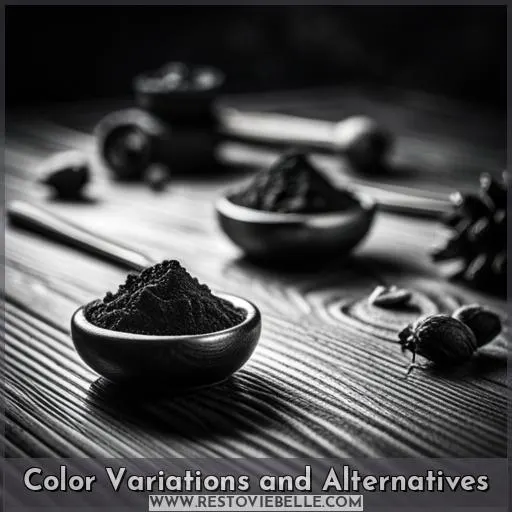This site is supported by our readers. We may earn a commission, at no cost to you, if you purchase through links.
 Looking to enhance your natural hair? Did you know that using henna can be a game-changer for your locks? Henna is not only a natural alternative to traditional hair dyes, but it also has numerous benefits for your hair health.
Looking to enhance your natural hair? Did you know that using henna can be a game-changer for your locks? Henna is not only a natural alternative to traditional hair dyes, but it also has numerous benefits for your hair health.
From strengthening and fortifying strands to reducing breakage and improving overall texture, henna can do wonders.
In this article, we’ll explore the benefits of using henna for natural hair and provide some application tips so you can achieve fabulous results.
Table Of Contents
- Key Takeaways
- Benefits of Henna for Natural Hair
- Color Variations and Alternatives
- Henna Application for Gray Hair
- Henna Gloss Application and Effects
- Impact of Henna on Hair Growth and Maintenance
- Frequently Asked Questions (FAQs)
- Can henna be used on chemically treated or relaxed hair?
- Will henna completely cover gray hair or will it leave it with a reddish tint?
- How long does henna color last on natural hair?
- Can henna be used to lighten or bleach dark hair?
- Are there any potential side effects or allergic reactions to using henna on natural hair?
- Conclusion
Key Takeaways
- Henna strengthens and fortifies hair strands, enhancing shine, strength, and resilience.
- It can reduce breakage, split ends, and shrinkage, improving overall hair health and texture.
- Cassia can be used as an alternative for conditioning effects without color, but caution is needed for individuals with gray hair.
- Henna, when combined with indigo, can result in glossy black hair, offering a subtle color change and deep conditioning.
Benefits of Henna for Natural Hair
Henna offers numerous benefits for natural hair.
It helps strengthen and fortify strands, enhancing their shine, strength, and resilience.
Additionally, henna can reduce breakage, split ends, and shrinkage while improving overall hair health and texture.
Strengthening and Fortifying Hair Strands
How does henna strengthen and fortify your hair strands?
Henna reduces hair breakage, split ends, prevents hair loss and thinning.
It improves hair elasticity, increases thickness and density while reducing overall damage to the hair.
Enhancing Shine, Strength, and Resilience
Enhance the shine, strength, and resilience of your natural hair by incorporating henna into your hair care routine.
Henna prevents hair breakage, promotes hair growth, reduces hair fall, and improves overall texture while nourishing the scalp.
Reducing Breakage, Split Ends, and Shrinkage
To reduce breakage, split ends, and shrinkage of your natural hair, henna provides a reliable solution.
Henna strengthens and fortifies the hair strands, improving overall hair health and texture for curly or dry hair types.
Improving Overall Hair Health and Texture
By using henna for your natural hair, you can improve the overall health and texture of your strands.
Henna prevents hair loss, reduces breakage, promotes hair growth, strengthens hair strands, and improves shine.
Managing ‘Loosening’ Effect
Are you struggling with maintaining your natural hair’s curl pattern after using henna?
Incorporate amla powder to maintain curls.
Opt for ‘roots-only’ treatments to preserve curls.
Apply conditioner/oil to protect hair length.
Utilize applicator tubes for precise application and wrapping techniques to reduce curl shrinkage.
Color Variations and Alternatives
When it comes to color variations and alternatives, there are a few options to consider.
One alternative is using Cassia, which provides conditioning effects without adding color.
Another option is utilizing Henna + Indigo for glossy black hair results. However, it’s important to exercise caution when using Cassia on gray hair as the results may vary.
Using Cassia as an Alternative for Conditioning Effects Without Color
If you’re looking for a conditioning alternative to henna that doesn’t add color, consider using cassia.
Benefits of cassia for hair include:
- Promoting growth
- Preventing hair loss
- Thickening strands
- Strengthening overall hair health
It’s a natural option with similar effects to henna without the added color variation.
Mixing Options With Cassia Like Oils, Conditioners, or Honey
To achieve different color variations and alternatives, you can mix cassia with oils, conditioners, or honey. This allows for customization based on your hair type and porosity. Experimenting with different mixing options will result in a range of colors and consistencies.
Remember to adjust application time accordingly for desired results and follow maintenance tips for long-lasting effects.
Utilizing Henna + Indigo for Glossy Black Hair Results
To achieve glossy black hair results, you can utilize henna and indigo as color variations and alternatives. The henna + indigo ratio determines the darkness of the shade. It’s effective for covering gray hair, providing a natural-looking result.
- Experiment with different ratios of henna and indigo to achieve desired shades.
- Henna + Indigo combination covers gray hair effectively.
- Darker shades require higher proportions of indigo in the mixture.
- Adding more henna creates warmer undertones in brown or red hair.
- Conduct patch tests before full application for optimal results.
Caution for Gray Hair Individuals Using Cassia
When considering color variations and alternatives for gray hair individuals, exercise caution when using Cassia.
Cassia is often used as a natural alternative to henna but lacks the coloring properties. It doesn’t contain metallic salts like some other brands of henna, which can cause adverse reactions and make changing hair color difficult.
Henna Application for Gray Hair
If you’re looking to use henna for your gray hair, it’s important to note that multiple applications may be necessary for achieving darker results.
Before applying henna, make sure to cleanse your hair thoroughly, as grays can be resistant and require extra preparation.
Additionally, don’t forget to condition your hair after the application process to maintain moisture and ensure its health.
Multiple Applications Necessary for Darker Results
For achieving darker results when using henna on gray hair, it’s necessary to apply multiple applications.
Patience is key as color change takes time and development varies depending on individual hair type.
Importance of Cleansing Before Application for Grays
Before applying henna to cover gray hair, you should cleanse your hair thoroughly. Cleansing removes buildup and prevents staining, allowing the henna to penetrate effectively.
| Benefits of Cleansing Before Henna Application |
|---|
| Removes Buildup |
| Prevents Staining |
| Deepens Color |
| Improves Shine |
| Promotes Growth |
Properly cleansing your hair before applying henna is essential for optimal results. It helps remove any product buildup or impurities that may hinder the effectiveness of the dye. Additionally, it helps prevent staining on both your scalp and skin during application.
By creating a clean canvas on which to apply the henna paste, the pigments are able to deeply penetrate into each strand, resulting in a more intense color payoff that lasts longer.
Moreover, thoroughly cleansing your hair also enhances shine by removing any residue or dullness caused by product buildup. This allows light to reflect off each strand more effectively, resulting in lustrous and radiant locks after coloring with henna.
In addition, cleansing before application also promotes healthy growth as it clears away any debris or sebum accumulation around the follicles. By maintaining a clean environment at the root level, essential nutrients can reach each individual strand easily, supporting strong and robust growth over time.
Overall, ensuring proper cleansing before applying hennas not only prepares your hair for optimal absorption but also contributes to deeper colors, improved shine, and healthier strands promoting overall long-term health.
Conditioning Post-application for Hair Moisture
After applying henna to your gray hair, conditioning is crucial for optimal moisture retention.
Use a deep-conditioning treatment or mask after rinsing out the henna dye. Leave it on for about 30 minutes to an hour before rinsing thoroughly.
Repeat as needed and choose products specifically formulated for color-treated hair.
Real-life Example of Gray Hair Transitioning With Henna
If you’re considering using henna to transition your gray hair, let’s take a look at a real-life example.
By applying henna multiple times and incorporating patience, you can achieve beautiful results with color change.
Additionally, for black hair, combining henna with indigo is recommended.
Don’t forget to condition your hair post-application for optimum moisture retention.
Considering Henna + Indigo for Black Tresses Instead of Red
To achieve black tresses instead of red, consider incorporating henna + indigo into your gray hair application process. This combination provides natural dyeing options that can result in stunning and long-lasting color change.
- Henna + Indigo for Black Hair: Achieve rich black tones by combining henna with indigo powder.
- Henna + Indigo for Hair Color Change: Transform gray hair into a deep, lustrous black shade.
- Henna + Indigo for Hair Dye Results: Experience vibrant and fade-resistant color that lasts for weeks.
Henna Gloss Application and Effects
If you’re looking for a way to subtly change your hair color while also deep conditioning your strands, henna gloss might be the perfect option for you.
The slip provided by conditioner makes the application process easier and less messy.
With henna gloss, you can expect a slight tint on dark hair and potential coverage of grays, giving your locks a beautiful boost of color and nourishment.
Henna Gloss for Subtle Color Change and Deep Conditioning
To achieve a subtle color change and provide deep conditioning for your natural hair, henna gloss is an excellent option to consider.
Henna gloss is easy to use, allowing you to customize the timing based on your hair type.
It acts as a conditioner, promoting overall hair health while imparting a slight tint.
If you’re looking for more intense color results, combining henna with indigo can give you glossy black strands.
Additionally, henna gloss can be effective in covering gray hairs and improving their appearance.
Ease of Application Due to Conditioner’s Slip
Applying henna gloss becomes effortless due to the slip provided by the conditioner. This means less mess, no need for gloves, and no staining. It allows for even application without harsh chemicals.
Henna Gloss’s Slight Tint on Dark Hair and Effect on Grays
For those with dark hair or grays, henna glosses can provide a subtle tint and have transformative effects.
The henna gloss application can vary based on factors such as hair porosity, length, texture, and overall hair health.
Use of Specific Products Like DevaCare One Conditioner and HennaSooq’s Red Raj Henna
When using the henna gloss technique, you can achieve a slight tint on dark hair and enhance grays by incorporating specific products like DevaCare One conditioner and HennaSooq’s Red Raj henna.
These products provide deep conditioning while adding subtle color to your hair.
Personal Routine for Henna Gloss Application and Timing
To achieve a successful henna gloss application and optimal results, follow this simple personal routine:
- Apply the henna gloss once a week, 24 hours after showering.
- Mix the henna with conditioner and leave it on for 30 minutes.
Impact of Henna on Hair Growth and Maintenance
When it comes to using henna for natural hair, there are several potential benefits that can impact hair growth and maintenance.
- Henna strengthens the hair strands, leading to improved length retention and reduced breakage.
- The stimulating effects of applying and rinsing henna can also promote blood circulation in the scalp, potentially enhancing hair volume and density.
- Additionally, henna contains caffeine from tea leaves which has been known to reduce shedding and support healthy follicles.
It’s important to conduct personal research, patch testing, and exercise caution when incorporating henna into your natural hair care routine.
Improved Length Retention Due to Stronger Hair
Achieve improved length retention with stronger hair by incorporating henna into your natural hair care routine.
Henna strengthens the hair, reducing breakage and promoting healthy, shiny, and thicker strands.
Stimulating Effects During Application and Rinsing Process
As you apply and rinse henna in your hair, it stimulates the scalp through a soothing scalp massage. This stimulation promotes hair growth by improving blood circulation to the follicles, resulting in increased hair thickness, density, and volume.
Potential Impact on Hair Volume and Density
During the application and rinsing process, henna can potentially impact your hair volume and density.
However, there’s no scientific evidence to support claims of henna causing hair loss or thinning. Some individuals report that henna may contribute to thickening of the hair strands.
Benefits of Caffeine (from Tea) in Reducing Shedding
Reduce shedding and promote hair growth by incorporating caffeine from tea into your henna hair care routine.
Caffeine stimulates the scalp, increases blood circulation, promotes caffeine absorption for healthier follicles, reducing hair loss and thinning while improving overall scalp health.
Emphasizing the Importance of Personal Research, Patch Testing, and Caution
Before proceeding with henna application on your natural hair, it’s essential to emphasize the importance of:
- Conducting personal research
- Performing a patch test
- Exercising caution
This will help you avoid any potential henna reactions or adverse effects caused by metallic salts in certain brands of hair dye.
Frequently Asked Questions (FAQs)
Can henna be used on chemically treated or relaxed hair?
Henna can be used on chemically treated or relaxed hair, but it’s important to note that the results may vary. The color outcome might differ due to the previous chemical treatments, so conducting a strand test is recommended for desired expectations.
Will henna completely cover gray hair or will it leave it with a reddish tint?
Henna can cover gray hair, but it may leave a reddish tint. The coverage and resulting color depend on factors like the initial condition of your hair and the henna brand used.
How long does henna color last on natural hair?
The longevity of henna color on natural hair varies, as it gradually fades over time.
On average, expect the vibrant hues to last for about 4 to 6 weeks before a touch-up is needed.
Can henna be used to lighten or bleach dark hair?
Henna isn’t recommended for lightening or bleaching dark hair. Its natural pigments provide color deposit but lack the ability to lift existing color.
Instead, henna enhances and enriches your natural hair tone, offering depth and vibrancy without altering its base shade.
Are there any potential side effects or allergic reactions to using henna on natural hair?
Potential side effects or allergic reactions when using henna on natural hair include:
- Skin irritation
- Redness
- Itching
Patch testing is essential to identify any negative reactions before full application.
Conclusion
To sum it up, using henna for your natural hair can be a game-changer!
Not only does it provide a natural alternative to traditional dyes, but it also offers numerous benefits for your hair health.
From strengthening and fortifying strands to reducing breakage and improving texture, henna can work wonders.
Whether you’re looking for a subtle color change or a glossy black result, henna has you covered.
Just remember to do your research, patch test, and proceed with caution for the best results.
So why not give henna a try and enhance your natural locks?











